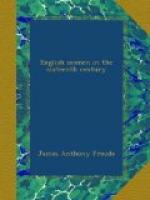The better-educated of the Ulster chiefs, the O’Rourke and O’Donnell, hurried down to stop the butchery and spare Ireland the shame of murdering helpless Catholic friends. Many—how many cannot be said—found protection in their castles. But even so it seemed as if some inexorable fate pursued all who had sailed in that doomed expedition. Alonzo de Leyva, with half a hundred young Spanish nobles of high rank who were under his special charge, made his way in a galleass into Killibeg. He was himself disabled in landing. O’Donnell received and took care of him and his companions. After remaining in O’Donnell’s castle for a month he recovered. The weather appeared to mend. The galleass was patched up, and De Leyva ventured an attempt to make his way in her to Scotland. He had passed the worst danger, and Scotland was almost in sight; but fate would have its victims. The galleass struck a rock off Dunluce and went to pieces, and Don Alonzo and the princely youths who had sailed with him were washed ashore all dead, to find an unmarked grave in Antrim.
Most pitiful of all was the fate of those who fell into the hands of the English garrisons in Galway and Mayo. Galleons had found their way into Galway Bay—one of them had reached Galway itself—the crews half dead with famine and offering a cask of wine for a cask of water. The Galway townsmen were human, and tried to feed and care for them. Most were too far gone to be revived, and died of exhaustion. Some might have recovered, but recovered they would be a danger to the State. The English in the West of Ireland were but a handful in the midst of a sullen, half-conquered population. The ashes of the Desmond rebellion were still smoking, and Dr. Sanders and his Legatine Commission were fresh in immediate memory. The defeat of the Armada in the Channel could only have been vaguely heard of. All that English officers could have accurately known must have been that an enormous expedition had been sent to England by Philip to restore the Pope; and Spaniards, they found, were landing in thousands in the midst of them with arms and money; distressed for the moment, but sure, if allowed time to get their strength again, to set Connaught in a blaze. They had no fortresses to hold so many prisoners, no means of feeding them, no men to spare to escort them to Dublin. They were responsible to the Queen’s Government for the safety of the country. The Spaniards had not come on any errand of mercy to her or hers. The stern order went out to kill them all wherever they might be found, and two thousand or more were shot, hanged, or put to the sword. Dreadful! Yes, but war itself is dreadful and has its own necessities.




